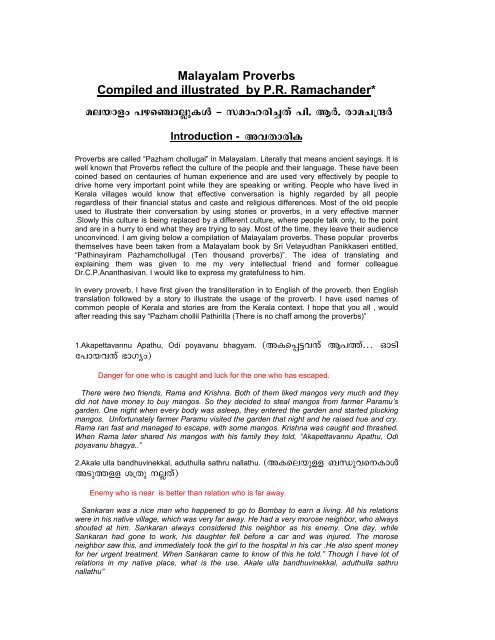Malyalam Proverbs - Raja Thatha's Corner
Malyalam Proverbs - Raja Thatha's Corner
Malyalam Proverbs - Raja Thatha's Corner
Create successful ePaper yourself
Turn your PDF publications into a flip-book with our unique Google optimized e-Paper software.
Malayalam <strong>Proverbs</strong><br />
Compiled and illustrated by P.R. Ramachander*<br />
aebmfw ]gs©mÃpIÄ -þ kamlcn¨Xv ]n. BÀ. cmaN{µÀ<br />
Introduction - AhXmcnI<br />
<strong>Proverbs</strong> are called “Pazham chollugal” in Malayalam. Literally that means ancient sayings. It is<br />
well known that <strong>Proverbs</strong> reflect the culture of the people and their language. These have been<br />
coined based on centauries of human experience and are used very effectively by people to<br />
drive home very important point while they are speaking or writing. People who have lived in<br />
Kerala villages would know that effective conversation is highly regarded by all people<br />
regardless of their financial status and caste and religious differences. Most of the old people<br />
used to illustrate their conversation by using stories or proverbs, in a very effective manner<br />
.Slowly this culture is being replaced by a different culture, where people talk only, to the point<br />
and are in a hurry to end what they are trying to say. Most of the time, they leave their audience<br />
unconvinced. I am giving below a compilation of Malayalam proverbs. These popular proverbs<br />
themselves have been taken from a Malayalam book by Sri Velayudhan Panikkaseri entitled,<br />
“Pathinayiram Pazhamchollugal (Ten thousand proverbs)”. The idea of translating and<br />
explaining them was given to me my very intellectual friend and former colleague<br />
Dr.C.P.Ananthasivan. I would like to express my gratefulness to him.<br />
In every proverb, I have first given the transliteration in to English of the proverb, then English<br />
translation followed by a story to illustrate the usage of the proverb. I have used names of<br />
common people of Kerala and stories are from the Kerala context. I hope that you all , would<br />
after reading this say “Pazham chollil Pathirilla (There is no chaff among the proverbs)”<br />
1.Akapettavannu Apathu, Odi poyavanu bhagyam. (AIs¸«hëv B]¯v… HmSn<br />
t]mbhëv `mKyw)<br />
Danger for one who is caught and luck for the one who has escaped.<br />
There were two friends, Rama and Krishna. Both of them liked mangos very much and they<br />
did not have money to buy mangos. So they decided to steal mangos from farmer Paramu’s<br />
garden. One night when every body was asleep, they entered the garden and started plucking<br />
mangos. Unfortunately farmer Paramu visited the garden that night and he raised hue and cry.<br />
Rama ran fast and managed to escape, with some mangos. Krishna was caught and thrashed.<br />
When Rama later shared his mangos with his family they told, “Akapettavannu Apathu, Odi<br />
poyavanu bhagya..”<br />
2.Akale ulla bandhuvinekkal, aduthulla sathru nallathu. (AIsebpff _Ôphs\ImÄ<br />
ASp¯ff i{Xp \ÃXv)<br />
Enemy who is near is better than relation who is far away.<br />
Sankaran was a nice man who happened to go to Bombay to earn a living. All his relations<br />
were in his native village, which was very far away. He had a very morose neighbor, who always<br />
shouted at him. Sankaran always considered this neighbor as his enemy. One day, while<br />
Sankaran had gone to work, his daughter fell before a car and was injured. The morose<br />
neighbor saw this, and immediately took the girl to the hospital in his car .He also spent money<br />
for her urgent treatment. When Sankaran came to know of this he told.” Though I have lot of<br />
relations in my native place, what is the use. Akale ulla bandhuvinekkal, aduthulla sathru<br />
nallathu”


